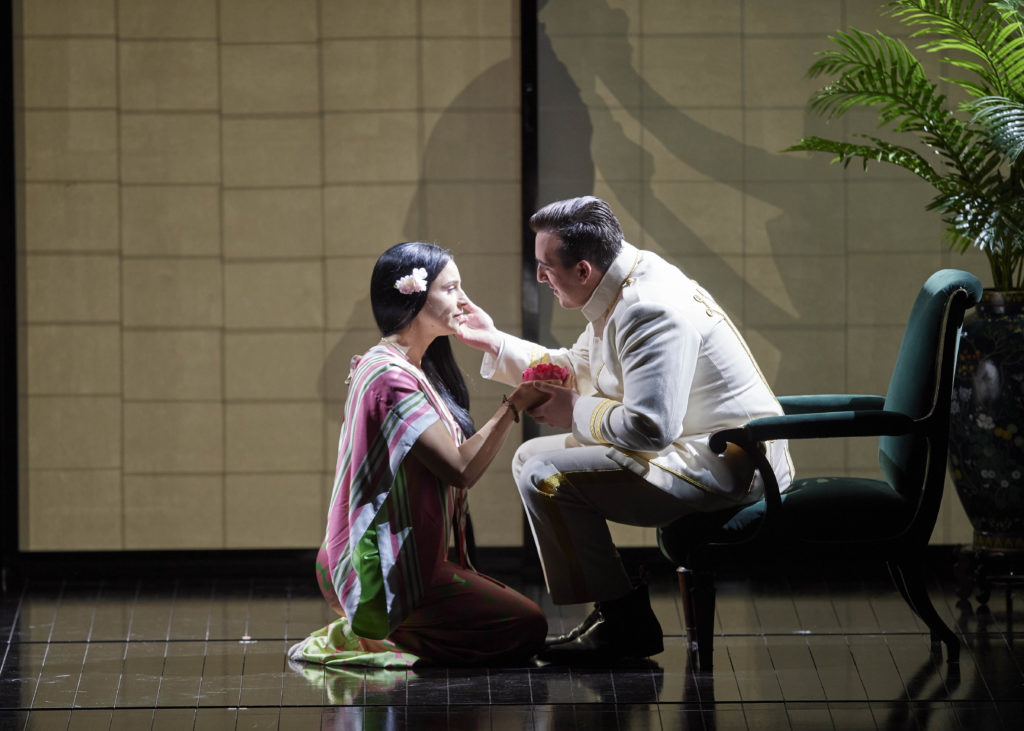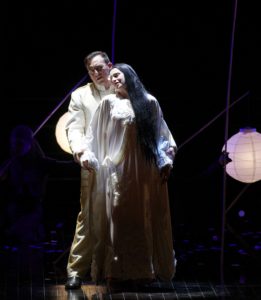 Vienna State Opera has reopened under its new Intendant Bogdan Roscic. The 2020/21 season, grounded in popular repertory, has revived classic productions sidelined by outgoing Dominic Meyer. So Puccini’s Madama Butterfly‘s long-running Fujita staging -‘authentic’ Japanese, austere- is replaced by the romantic vision of Anthony Minghella’s (2005 production). Minghella’s sensuous, vibrant colour is a feast for the eyes, (what, arguably, we need in these grim times.)
Vienna State Opera has reopened under its new Intendant Bogdan Roscic. The 2020/21 season, grounded in popular repertory, has revived classic productions sidelined by outgoing Dominic Meyer. So Puccini’s Madama Butterfly‘s long-running Fujita staging -‘authentic’ Japanese, austere- is replaced by the romantic vision of Anthony Minghella’s (2005 production). Minghella’s sensuous, vibrant colour is a feast for the eyes, (what, arguably, we need in these grim times.)
And the orchestra- Vienna State Opera’s under new MD Philippe Jordan- wonderfully clear-textured, precisely-detailed playing. Maybe to do with the 1 meter distancing required: Jordan’s smaller orchestra revealing Puccini’s score in all its subtlety, vibrato layering stripped away.
Backstage, out of a red rectangle of light emerges a geisha dancer, trailing red silk banners.
And the walls … ‘Where is the nuptial?’- ‘It too has sliding walls’…It’s down to business with Lieutenant Pinkerton negotiating with Goro for his ‘honeymoon’ home: ‘A shaky little house, you could blow it away.’ Pinkerton, exciting british-italian tenor Freddie De Tommaso, sings he’s like a man opening a pearl, but she, Cio-Cio-San, chatters like a woman of the world.
The stage (Michael Levine) is divided by white screens. The lease is for 99 years (Puccini’s libretto strong on detail), but he can cancel anytime. Everywhere in the world the roaming yankee gets his money’s worth. Tommaso’s replendent tenor commands; six foot of masculine swagger.
He sings to US Consul Sharpless of his ‘easy-going creed’. If beaten he’s up and away. Boris Pinkasovich’s Sharpless is sympathetic, his beautiful baritone saddened by Pinkerton’s creed with its ruthless consequences.
The bride, is she pretty?- And so cheap, 100 yen!- Does he love her? – She’s bewitching him. She’s slender, like a painted figure. A butterfly. To Sharpless, it would be wrong to harm the little thing. They drink a toast, Pinkerton to an American girl.
Cio-Cio-San (Asmik Grigorian) appears with her geisha friends. I am the happiest girl in Japan, in the entire world, she sings; she knows that love has come. Grigorian’s burnished soprano is meltingly beautiful; no dissimulation, pure feeling.
He asks, if the climb was arduous. She replies, for a bride, impatience is harder to bear. Grigorian’s now in a white kimono, Tommaso brilliant-white naval uniform. He notes hers are real gems.
We have to make our living as geishas, she sings to her friends. She doesn’t hide it. But to Pinkerton, she’s like a doll: enticing. (How old is she- 10, 15?- his friends bet.) She admits she’s turned fifteen.
The parade of wedding relatives is a burst of brilliant-coloured silks. Pinkerton, his breath blown away. But take care, she believed in you, warns Sharpless.
Come my love, do you like the house? She’d like to show him something. (Behind the white screen enclosing the living room, we see her relatives squatting.) She shows him her box of family treasures: those dolls, the souls of her ancestors. She sings, she went to the Mission to adopt ‘the new religion’. For him she might be able to forget her own people.
Cio-Cio-San’s dilemma’s having to renounce her culture, adopting her husband’s ‘values’. Puccini’s theme – Illica and Giacosa’s libretto from David Belasco’s play- is the very modern one of cultural hibridity. She’s denounced by her uncle (Evgeny Solodovnikov), buddist priest, who gatecrashes the wedding. He accuses her of renouncing them all. We reject you! Pinkerton won’t tolerate all this shouting in his own house. She’s upset. Don’t cry, ‘the whole tribe of them aren’t worth a tear’, his callous reply, imperialist contempt.
 Viene la sera. Evening is coming; let us shut out the world’, he lures her. Their great love scene sweeps us all away; it’s a seduction, but he’s ‘married’ her, and really has fallen in love. Grigorian and Tommaso have an ineffable chemistry. With sensitive orchestral playing, the staging is magical, Japanese pageant re-imagined.
Viene la sera. Evening is coming; let us shut out the world’, he lures her. Their great love scene sweeps us all away; it’s a seduction, but he’s ‘married’ her, and really has fallen in love. Grigorian and Tommaso have an ineffable chemistry. With sensitive orchestral playing, the staging is magical, Japanese pageant re-imagined.
For her, he’s the star in the firmament. But in Puccini’s scoring, there’s trace of foreboding in the viola solo. Paper lamps, white, illuminated; blossoms falling like snowflakes. Transcendent. He stands behind her, kisses her ear. How will his name suit her? -She, in his country, butterflies are pinned to a board. Dismiss all fear, the night is asleep. Orchestra builds cumulative waves of passion.
This little toy is my wife, he sings. She, of the angry voice still commanding her. Finally, Butterfly’s cast out and happy. Dear child with wonderful eyes, you’re all mine. For him, it’s all about possession. He sings, you haven’t said you love me. She fears
dying from pleasure. She sheds her white gown, revealing her pink underwear; he covers her. Now there’s a veil of gold petals. He carries her off in his arms, escorted by lamp bearers. (Direction and choreography by Carolyn Choa.)
White screens, black-lacquered dining room furniture, brightly coloured petals falling. Suzuki (mezzo Virginie Verrez) appeals to the gods, don’t let her weep any longer, an oboe wails plangently. Japanese gods are lazy, Americans’ faster, counters Cio-Cio. Suzuki asks, how much do we have.( Pinkerton arranged their rent.) Cio-Cio excuses him, keeping troubles away. Verrez insists, no foreign husband has ever returned. Grigorin is simply heart-rending in her aria (Un bel di), one day they’ll see a thin column of smoke, the white ship. In pink, her hair plaited, she stands defiant in her belief.
Sharpless, the nice guy, has got ominous news; she, still the happiest woman in Japan. She sings, he’d promised to return ‘when robins build their nests’; three years have passed. Sharpless can’t bear to tell her. Cio-Cio self-deluded, you can’t shoo-shoo an ‘American’ wife away. Sharpless tries to read her Pinkerton’s letter: PREPARE HER! What would she do if he never returned, he asks. Delight people with her singing; or die, she sings. – Marry Prince Yamadoro, as Goro arranged.- She furiously dismisses Sharpless. Never again that profession!
And now the shock …her son- brilliantly white make-up- born after he left. ‘A matchless son awaits him.’
In her aria, his name is SORROW, but – Grigorian now incandescent- his name will be JOY when he returns. The boy’s in a cute US sailors outfit. (In fact a puppet.) The group huddle together as she reads the name of Pinkerton’s ship. Grigorian, with an overwhelming surge of emotion, he’ll come back and love me.
The front of stage is LINED WITH BRIGHT RED FLOWERS!! She applies rouge to remind her how she looked on that spring day. Now back in her white wedding gown, with red satin. (Subtly the screens are a mix of autumn browns.)
Against a darkened stage, Grigorian’s Cio-Cio is sitting, back erect, ceremoniousy waiting. In a remarkably choreographed puppet sequence, a dancer in black holds a child aloft; offered to Cio-Cio, and withdrawn.
The stage is lit up, a gold panel illuminated. Pinkerton arrives with Sharpless, and it’s Suzuki who meets him. (Verrez sings with  sensitivity and pathos.) Tommaso/Pinkerton, in dark-navy uniform, silhouetted against the welcoming pink bouquet, is deeply moved by Suzuki’s description of Cio-Cio’s vigil. At least now he realises what he’s done, and Tommasso sings, she will haunt him forever. Pinkerton has to leave, admitting he’s a coward, Tommaso’s Adio fioriti asil , with sensational power, genuine emotion.
sensitivity and pathos.) Tommaso/Pinkerton, in dark-navy uniform, silhouetted against the welcoming pink bouquet, is deeply moved by Suzuki’s description of Cio-Cio’s vigil. At least now he realises what he’s done, and Tommasso sings, she will haunt him forever. Pinkerton has to leave, admitting he’s a coward, Tommaso’s Adio fioriti asil , with sensational power, genuine emotion.
Grigorian emotionless, without affectation, ‘But he will no longer return?’ Then, increasingly agitated, that woman, she’s his wife, now everything’s over. Yet resigned, sings to Pinkerton’s wife, be not sad on my account, (you, the happiest woman in the world.)
‘He dies with honour ‘who can no longer love with honour.’ Cio-Cio grimly prepared, her child must not know of her suicide. Red-silk ribbons flow from her. Backstage black silhouttes holding gold fans; Japanese script engoldened on black stage-curtain.
Staatsoper’s Roscic, Corona-safe, requested no bravos, but clap-as-hard-as-you like. They did. But they cheered anyway. © PR 13.9.2020
Photos: Asmik Grigorian (Cio-Cio-San), Freddie De Thommaso (Pinkerton); Freddie De Thommaso and Asmik Grigorian; Asmik Grigorian (Cio-Cio-San); Featured Image Asmik Grigorian (Cio-Cio-San) and Freddie De Tommaso (Pinkerton).
© Wiener Staatsoper/ Michael Pöhn. All photos subject to Wiener Staatsoper’s strict copyright.

I抳e read some good stuff here. Definitely worth bookmarking for revisiting. I surprise how much effort you put to create such a fantastic informative web site.